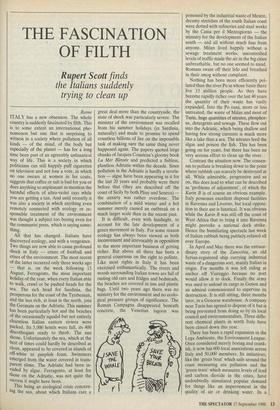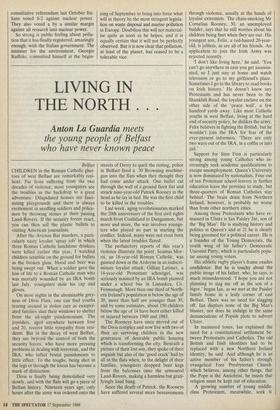THE FASCINATION OF FILTH
Rupert Scott finds
the Italians suddenly trying to clean up
Rome ITALY has a new obsession. The whole country is suddenly fascinated by filth. This is to some extent an international phe- nomenon but one that is surprising to witness in a society where pollution of all kinds — of the mind, of the body but especially of the planet — has for a long time been part of an agreeably unfanatical way of life. This is a society in which politicians can still happily puff cigarettes on television and not lose a vote, in which no one swears at women in fur coats, suggests that coffee or salt is bad for you or does anything so unpleasant as mention the harmful effects of ultra-violet rays while you are getting a tan. And until recently it was also a society in which anything even remotely connected with ecology or re- sponsible treatment of the environment was thought a subject too boring even for the communist press, which is saying some- thing.
All that has changed. Italians have discovered ecology, and with a vengeance. Two things are now able to cause profound shock in Italy — crises of football and crises of the environment. The most recent of the latter occurred only three weeks ago — that is, on the week following 15 August, Ferragosto, the most important holiday of the year, when every Italian able to walk, crawl or be pushed heads for the sea. The rich head for Sardinia, the prosperous for the coast of the Tyrrhenian, and the less rich, at least in the north, join the Germans on the Adriatic. This summer has been particularly hot and the beaches of the occasionally squalid but not entirely charmless Italian eastern riviera were packed. Its 5,000 hotels were full, its 400 discotheques ready to throb. The sun shone. Unfortunately the sea, which at the best of times could hardly be described as clean, appeared to be covered in islands of off-white to purplish foam. Swimmers emerged from the water covered in trans- parent slime. The Adriatic had been in- vaded by algae. Ferragosto, at least for those on the Adriatic, was not quite the success it might have been. This being an ecological crisis concern- mg the sea, about which Italians care a great deal more than the countryside, the state of shock was particularly severe. The minister of the environment was recalled from his summer holidays (in Sardinia, naturally) and made to promise to spend countless billions of lire on the impossible task of making sure the same thing never happened again. The papers quoted large chunks of Jacques Cousteau's gloomy book La Mer Blessee and predicted a fishless, plantless Adriatic within the decade. Since pollution in the Adriatic is hardly a revela- tion — algae have been appearing in it for the last 20 years and probably were there before that (they are described off the coast of Sicily by both Pliny and Seneca) the anxiety was rather overdone. The combination of a mild winter and a hot summer merely caused an outbreak on a much larger scale than in the recent past.
It is difficult, even with hindsight, to account for the late development of a green movement in Italy. For some reason ecology has always been viewed as both inconvenient and irrevocably in opposition to the more important business of getting richer. But above all there has been a general consensus on the right to pollute. Like most rights in Italy it has been exercised enthusiastically. The rivers and woods surrounding Italian towns are full of rusting old cars and fridges and bedsteads, the beaches are covered in tins and plastic bags. Until two years ago there was no ministry for the environment and no ecolo- gical pressure groups of significance. The Roman Campagna disappeared beneath concrete, the Venetian lagoon was poisoned by the industrial waste of Mestre, dreamy stretches of the south Italian coast were dotted with refineries and steel works by the Cassa per it Mezzogiorno — the ministry for the development of the Italian south — and all without much fuss from anyone. Milan lived happily without a sewage treatment works, uncontrolled levels of traffic made the air in the big cities unbreathable, but no one seemed to mind. Romans swam off their lido and breathed in their smog without complaint.
Nothing has been more efficiently pol- luted than the river Po in whose basin there live 15 million people. As they have become rapidly richer over the last 40 years the quantity of their waste has vastly expanded. Into the Po runs, more or less untreated, the waste of Milan and most of Turin, huge quantities of nitrates, phosphor- us, detergents and sewage. These flow out into the Adriatic, which being shallow and having few strong currents is much more like a lake than a sea. The nitrates feed the algae and poison the fish. This has been going on for years, but there has been no very serious effort to clean up the river.
Contrast the situation now. The consen- sus to pollute is breaking down to the point where rubbish can scarcely be destroyed at all. While admirable, progressive and so on, this does lead to what can be described as 'problems of adjustment', of which the Karin B is of course an obvious example. Italy possesses excellent disposal facilities in Ravenna and Livorno, but local opposi- tion to their use is fanatical. It was obvious while the Karin B was still off the coast of West Africa that to bring it into Ravenna might provoke a national dock strike. Hence the humiliating spectacle last week of Italian rubbish being publicly refused all over Europe.
In April and May there was the extraor- dinary story of the Zanoobia, an old Syrian-registered ship carrying industrial waste of a dangerous sort, mainly Italian in origin. For months it was left riding at anchor off Viareggio because no port would allow it to dock. Finally the army was used to unload its cargo in Genoa and an admiral commissioned to supervise its destruction. It is still sitting, three months later, in a Genoese warehouse. A company near Turin has agreed to dispose of it but is being prevented from doing so by its local council and environmentalists. Three diffe- rent chemical plants in north Italy have been closed down this year.
There has been a rapid expansion in the Lega Ambiente, the Environment League. Once considered merely boring and crank- ish, it now has 600 local associations across Italy and 50,000 members. Its initiatives, like the 'green boat' which sails around the coast measuring sea pollution and the `green train' which measures levels of lead and carbon dioxide in the cities, have undoubtedly stimulated popular demand for things like an improvement in the quality of air or drinking water. In a consultative referendum last October Ita- lians voted 8-2 against nuclear power. They also voted a by a similar margin against all research into nuclear power.
So strong is public feeling about pollu- tion that it has finally registered, amazingly enough, with the Italian government. The minister for the environment, Georgio Ruffolo, committed himself at the begin- ning of September to bring into force what will in theory be the most stringent legisla- tion on waste disposal and marine pollution in Europe. Doubtless this will not material- ise quite as soon as he hopes, and it is equally certain that it will not be perfectly observed. But it is now clear that pollution, at least of the planet, has ceased to be a tolerable vice.



































































 Previous page
Previous page